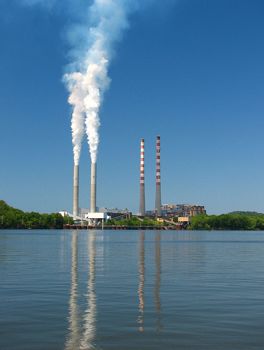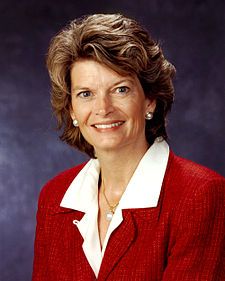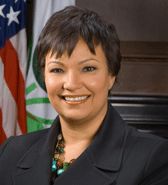Congressional Fight Over CO2
Air Date: Week of November 19, 2010
 |
The Environmental Protection Agency will start regulating greenhouse gases from some of the country's biggest sources in January. With the death of climate change legislation in Congress, EPA's use of the Clean Air Act is one of the few tools the Obama administration has left to address global warming pollution. But in a showdown on Capitol Hill, some lawmakers aim to block EPA from taking action. Living on Earth’s Jeff Young reports on what’s at stake.
Transcript
GELLERMAN: Come early January, the U.S. Environmental Protection Agency will take a major step toward restricting greenhouse gases. The agency will begin regulating emissions from large stationary sources, such as power plants, major refineries and chemical facilities. That is, unless, Congress says no. A growing contingent of lawmakers wants to stop or delay the EPA’s greenhouse gas rules. Living on Earth’s Jeff Young explains what’s at stake.
YOUNG: For the past few weeks the most pressing matter for Alaska Senator Lisa Murkowski has been spelling. She still faces a legal challenge from her opponent, but it looks like Sen. Murkowski has waged the first successful write-in campaign for Senate since 1954. Alaskans, it turns out, can spell her name.
MURKOWSKI: We did have a pictogram. It was M-U-R +, and then a picture of a cow with a K on the cow’s belly, and then a pair of skis. So, we were reminding people that, look, this is not that difficult.
YOUNG: Now Senator Murkowski can return to another pressing matter: spelling out for the EPA what it should and should not do about global warming. She’s the top Republican on the Senate’s energy committee. This summer Senator Murkowski got 47 votes –far short of the 60 needed
—for a senate resolution that would have stripped EPA of its authority to regulate greenhouse gases. She pledges to try again.
MURKOWSKI: What we fear is the inclusion of not just the largest emitters, but the gym down by my neighborhood or the dry cleaner, the facilities you have in your neighborhood.
YOUNG: In 2007 the Supreme Court ruled EPA must consider carbon dioxide a pollutant under the Clean Air Act. For most pollutants, the act requires regulation for any source of 250 tons or more a year. But because CO2 is such a different kind of pollutant, EPA took a different approach. It will only apply the regulations to facilities that emit at least 75 thousand tons of CO2. But Senator Murkowski doubts that will stand in the courts.

Senator Lisa Murkowski (R/ AK)
MURKOWSKI: You’re gonna have the first law suit that says, ‘no wait a minute, the Clean Air Act says anything over 250 tons,’ and so then EPA is gonna be forced to regulate them. So, even though administrator may say, look, this is not our intent, under the Clean Air Act, that’s kinda where you’re stuck.
YOUNG: EPA administrator Lisa Jackson has tried to assure Congress and the business community that Senator Murkowski’s scenario of regulations for mom-and-pop stores won’t come to pass. Here’s what Jackson told a gathering at Georgetown Law School last year:
JACKSON: There is this myth—it is a myth—EPA will regulate cows, dunkin’ donuts, pizza huts, your lawn mower, someone said to me kittens-- I like that one. And, it’s overzealous and somehow misguided, and somehow, you know, strange unfurling of regulatory might that will happen any second now because nobody is putting the breaks on EPA. It is not true.
YOUNG: But the rhetoric against Jackson’s agency is heating up as the start date for the new rules approaches. Industry representatives warn of a possible halt to new plant construction and economic havoc as state agencies become overwhelmed trying to deal with new CO2 permits. Bill Becker has a one-word answer for all that:

Administrator of the Environmental Protection Agency, Lisa Jackson. (EPA)
BECKER: “Baloney.”
YOUNG: Becker leads the National Association of Clean Air Agencies. His members are the ones who actually do most of the work writing Clean Air Act permits at the state level. Becker says state agencies are well prepared for the new greenhouse gas rules. And EPA’s guidelines mean that most facilities will simply need to improve efficiency in order to reduce emissions.
BECKER: If you listen to industry, they’d have you believe that they’re going to be asked to do some things that are impossible, that’s going to shut them down. And the fact of the matter is all states are primed, except for one, to start this program and the kinds of actions that state and local permitting authorities will be asking industry to do are smart, sensible, energy efficiency ones.
YOUNG: Texas is the only state refusing to participate in the greenhouse gas program. But several states joined Texas in suing EPA over the new rules, and challenges in Congress are almost certain. Republican leaders pledge to use control of the House to investigate EPA’s actions. And they’ll get support from Democrats from the more fossil fuel dependent states. West Virginia Democratic Senator Jay Rockefeller is pushing a proposal to delay any EPA action by two years. The president has pledged to veto any such attempts. But Professor Robert Stavins at Harvard’s Kennedy School of government says it adds up to some tricky politics for EPA.

(Roger Smith)
STAVINS: The EPA is right in the middle, and some people would say they’re trying to walk a knife-edge here.
YOUNG: Stavins says EPA risks alienating conservative Democrats and empowering Republicans who want to paint the administration as anti-business. On the other hand, the EPA rules are crucial, both to reduce emissions and to give the president concrete action he can point to in international climate talks. And Stavins adds, this is not a position the administration wanted to be in.
STAVINS: Everyone in administration, from the president on down has said that the preferred way to address climate change is with Congressional action. But, if that wasn’t there, then they were obligated, as they would say, to go the regulatory route. So, that was a threat. Well, you know, the bluff, you could say has been called. This is something they’re not particularly eager, in my opinion, to go forward with.
YOUNG: Stavins says the coming year will be a test of the agency’s commitment and creativity when it comes to using an old law to take on a new challenge. For Living on Earth, I’m Jeff Young.
GELLERMAN: You can hear Jeff’s full interview with Sen Murkowski at our website, L-O-E dot org.
Links
EPA explains its regulatory approach to greenhouse gases
A report on state clean air agencies preparedness to carry out greenhouse gas permits
Living on Earth wants to hear from you!
Living on Earth
62 Calef Highway, Suite 212
Lee, NH 03861
Telephone: 617-287-4121
E-mail: comments@loe.org
Newsletter [Click here]
Donate to Living on Earth!
Living on Earth is an independent media program and relies entirely on contributions from listeners and institutions supporting public service. Please donate now to preserve an independent environmental voice.
NewsletterLiving on Earth offers a weekly delivery of the show's rundown to your mailbox. Sign up for our newsletter today!
 Sailors For The Sea: Be the change you want to sea.
Sailors For The Sea: Be the change you want to sea.
 The Grantham Foundation for the Protection of the Environment: Committed to protecting and improving the health of the global environment.
The Grantham Foundation for the Protection of the Environment: Committed to protecting and improving the health of the global environment.
 Contribute to Living on Earth and receive, as our gift to you, an archival print of one of Mark Seth Lender's extraordinary wildlife photographs. Follow the link to see Mark's current collection of photographs.
Contribute to Living on Earth and receive, as our gift to you, an archival print of one of Mark Seth Lender's extraordinary wildlife photographs. Follow the link to see Mark's current collection of photographs.
 Buy a signed copy of Mark Seth Lender's book Smeagull the Seagull & support Living on Earth
Buy a signed copy of Mark Seth Lender's book Smeagull the Seagull & support Living on Earth

